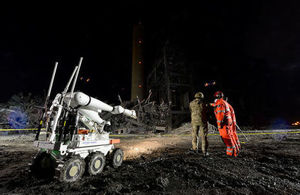Niteworks 3: improving support solutions for explosive ordnance disposal equipment
Improving the reliability and support of explosive ordnance disposal equipment by providing wide industry experience to the support solutions.

The pictures shows the Explosive Ordnance Disposal Equipment hard at work.
Background
Much of the equipment currently in service to support explosive ordnance disposal (EOD) activity is highly complex, low population and must be maintained at very high availability levels. The fleet of equipment operates from dispersed locations in harsh conditions; failure rates are high and repair times can be long. Traditional support solutions have proven to be expensive and performance levels have been poor, leading to low availability levels and operational risk.
Niteworks Task
Niteworks was tasked to support the Ministry of Defence (MOD) in developing a strategy to improve the reliability of EOD equipment and increase the effectiveness and efficiency of support solutions by researching industry experience, best practice and innovation.
How did Niteworks approach the task?
The team carried out an in-depth analysis of the current situation to identify the underlying causes having an impact on equipment reliability and the critical stress points of the existing support solutions. This was followed by targeted engagement with industry experts to identify candidate options for addressing the key issues and cross-defence lines of development (DLOD) factors to be considered.
What was the outcome?
The study identified a number of primary causes of poor equipment reliability, primarily in the areas of inherent design problems and excessive utilisation rates in the training organisation. Shortfalls in support solutions were also identified, including the spares procurement strategy, repair policy and fleet management practice.
A number of detailed recommendations were made for improvements in equipment design and modification, a revised Level of Repair Analysis (LORA), operator and maintainer training, spares provision and general logistic issues such as battery management. Recommendations were prioritised in terms of potential impact on cost saving and availability improvement, to inform the MOD’s strategy development.
The study also identified a number of options for improving the long term support arrangements in line with forthcoming contract renewal timelines. These were based on current industry best practice and focused on achieving the optimal balance between in-house delivery and outsourced support, backed up by robust contracts with clear performance targets.
What were the benefits?
As a result of the study, the MOD has an improved understanding of the underlying causes of equipment reliability problems and shortfalls in the support solutions. This has informed the targeting of resources where they will have most impact on improving equipment availability and has focused attention on the primary causes rather than the symptoms previously observed.
Together with future improvements in support contracts, this will deliver benefits in the areas of:
- reduced equipment failures and improved repair times leading to reduced operational risk
- improving readiness and providing resilience through greater fleet availability
- reduced support costs and military manpower requirement